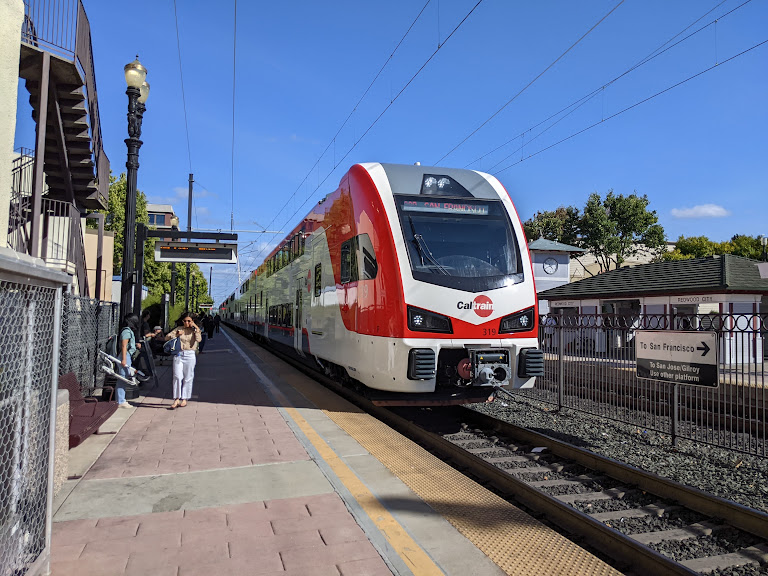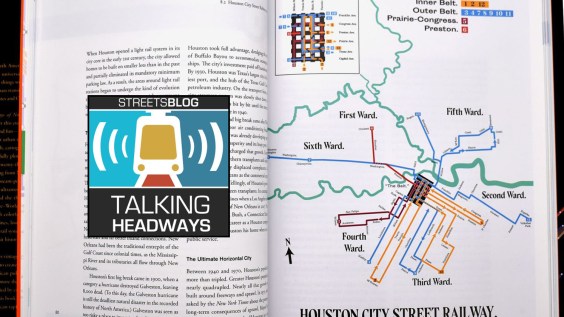 Photo: Richard
Photo: RichardMasoner
When Governor Arnold Schwarzenegger proposed eliminating the sales tax on gasoline in his new budget, transit operators and advocates saw the announcement as a move to subvert a California Supreme Court ruling that required the state to stop raiding transit funds.
Rather than comply with the court's ruling, they argued, the Governor was eliminating the voter-established rules that required the state to fund transit operations with the sales tax on gasoline. Nevermind that several of those ballot initiatives passed by more than two-thirds margins and put explicit restrictions on how taxpayer money could or couldn't be used for transportation projects.
Now many of those transit operators are supporting two bills (ABX8 6 and ABX8 9) that would do as the Governor proposed by eliminating the sales tax on gasoline, but would retain the sales tax on diesel. Rather than cry foul, lobbyists for those operators worked with legislators to develop the bills.
California Transit Association (CTA) Communications Director Jeff Wagner said with the legislature and the Governor thwarting the law and the will of the voters for years by raiding the the State Transit Assistance fund (STA), which is fed in part by the
sales tax on gasoline (as well as the sales tax on diesel and other
sources), and with Supreme Court rulings in the CTA's favor doing little to change the situation, his organization was taking steps to secure some kind of steady state funding for operators.
"Our fundamental position is in opposition to the elimination of the sales tax [on gasoline], but that has long seemed a foregone conclusion," said Wagner. "Given that lay of the land, we've worked with the legislature to get some level of funding for public transit. What this package does give us is the ability for transit to get funding that it isn't currently getting."
According to Wagner, if the Governor signs the bills, which could happen imminently, the state would establish a baseline of $350 million each year into transit operations (with allocations projected to reach $400 million in 2016-17 and $500 million in 2020-21), compared to an average annual STA allocation of $258.5 million over the
last five years and $189.9 million over the last ten years. The money would come from the sales tax on diesel, which is expected to increase in future budget cycles. What's more, a one-time allocation of $400 million would be released to operators this year, which would mean tens of millions of dollars for each of the largest Bay Area agencies.
"It makes great progress for establishing stable and reliable funding for public transit that has been missing in recent budget years as a result of the raids of the funds in question," said Wagner.
As we've reported, local operators are thrilled to get an immediate infusion of money, which will go a long way toward plugging budget deficits. In San Francisco, Mayor Gavin Newsom hailed the "good news from Sacramento" and MTA Chief Nat Ford said "the funding would clearly help us provide more reliable transit service to our customers."
Some advocates are concerned, however, that the short-term gain will do nothing to secure long-term transit funding, given the state's propensity to raid transit funds. TransForm's Carli Paine raised a number of concerns about the new legislation; foremost among them is what would guarantee that the legislature and the Governor won't be back at the public transportation trough next year when the next budget crisis arises.
"I'm concerned that we're losing the few legal protections that offered hope that we would actually start seeing some of that money," said Paine. "All we have left is the Governor's and legislators' word that some money will go to transit, but they haven't been good on their word."
While the new legislation removes the central funding stream from several voter initiatives, legislators didn't believe the move was contrary to the voters' will. According to Alicia Trost, State Senate Pro Tem Darrell Steinberg's press secretary, the new bills are "in the spirit of long-term funding" for transit operations. When asked what would guarantee that lawmakers wouldn't raid the transit trust funds next year, Trost said she would look into the answer, but didn't call back by press time.
Paine was also troubled that an early provision in the bill to give local jurisdictions the authority to raise fees for transit had been removed. "In the current proposal, that ability for regions to help themselves has been stripped away," said Paine, who noted that Bay Area voters have repeatedly voted to tax themselves to provide more money for transit.
To that end, Wagner said the CTA would continue to participate in the Local Taxpayer, Public Safety, and Transportation Protection Act of 2010, a ballot initiative that would prevent the state from taking locally approved tax measures for the general fund. According to proponents of the initiative, since 1992, lawmakers have taken $11.2 billion in locally approved tax measures for the general fund, $5 billion of that coming in the last ten years from transit funds.
"We are still continuing our involvement with the 'Protect Local' initiative," said Wagner. "We feel the initiative has further protections to transit funds."
(Source: CTA)
Proposition 116, June 1990
Rail Transportation. Bond Act
Yes: 53.3%, No: 46.7%
SUMMARY: Authorizes general obligation bond issue of $1,990,000.000 to provide funds principally for passenger and commuter rail systems, with limited funds available for public mass transit guideways, paratransit vehicles, bicycle and ferry facilities, and railroad technology museum.
IMPORTANT TO NOTE: The measure designated the Public Transportation Account as a trust fund, and specified that "the funds in the account shall be available, when appropriated by the Legislature, only for transportation planning and mass transportation purposes."
Proposition 2, November 1998
Transportation: Funding
Yes: 75.4 %, No: 24.6%
SUMMARY: Requires loans of transportation related revenues to the General Fund be repaid the same fiscal year, or within three fiscal years if the Governor declares an emergency significantly impacting the General Fund or General Fund revenues are less than the previous fiscal year's adjusted revenues. Allows loans of certain transportation related revenues to local entities conditioned upon repayment, with interest, within four years. Designates local transportation funds as trust funds and prohibits abolition of all such funds created by law. Restricts allocations from local transportation funds to designated purposes relating to local transportation.
IMPORTANT TO NOTE: This measure was a Constitutional Amendment placed on the ballot by the Legislature. The provisions of this measure couldn't be spelled out any more clearly, and yet every single one of them has been repeatedly violated.
Proposition 42, March 2002
Transportation Congestion Improvement Act. Allocation of Existing Motor Vehicle Fuel Sales and Use Tax Revenues for Transportation Purposes Only
Yes: 69.1%; No: 30.9%
SUMMARY: Requires, effective 7/1/03, existing revenues from state sales and use taxes on sale of motor vehicle fuel be used for transportation purposes as provided by law until 6/30/08. Requires, effective 7/1/08, existing revenues resulting from state sales and use taxes on sale of motor vehicle fuel be used for public transportation; city and county street and road repairs and improvements; and state highway improvements.
IMPORTANT TO NOTE: Another Legislative Constitutional Amendment, 20 percent of the funds from which are supposed to flow to transit through the Public Transportation Account.
Proposition 1A, November 2006
Transportation Funding Protection
Yes: 77%; No 23%
SUMMARY: Protects transportation funding for traffic congestion relief projects, safety improvements, and local streets and roads. Prohibits the state sales tax on motor vehicle fuels from being used for any purpose other than transportation improvements. Authorizes loans of these funds only in the case of severe state fiscal hardship. Requires loans of revenues from states sales tax on motor vehicle fuels to be fully repaid within the three years. Restricts loans to no more than twice in any 10-year period.
IMPORTANT TO NOTE: Yet another Constitutional Amendment placed on the ballot by the Legislature, Prop 1A specifically restricted access to Prop 42 funds for transfer to the General Fund, and specified that no such "loans" could take place unless all prior "loans" had been repaid in full.





